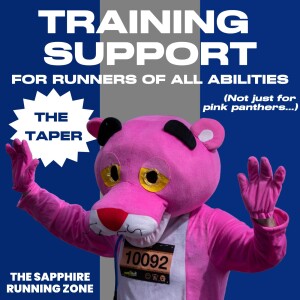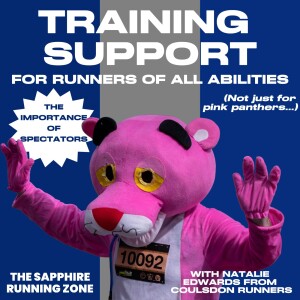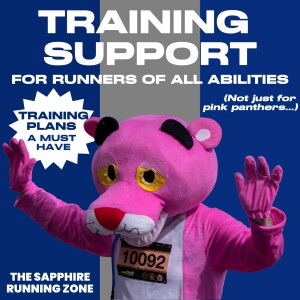TRAINING AND FUNDRAISING SUPPORT FOR RUNNERS
The Sapphire Running Zone specialises in providing running training and fundraising support for runners of all levels. Founder Tim Rogers is a veteran of 73 marathons and over 200 half marathons, many in fancy dress. He held the world record for running an official marathon on all 7 continents in the quickest time, has written 3 running books and was one of the first to run all of the world marathon majors in a calendar year. Here Tim and special guests will share their experiences and answer your questions. Running is one the greatest ways to lose weight and has huge mental health benefits, but it’s even better when you get the right support and when you fundraise.
Episodes

Thursday Jun 26, 2025
Thursday Jun 26, 2025
Thankfully runners don't need to invest in too much expensive kit, but one essential is a decent pair of running shoes and they don't come cheap. Have a listen to this podcast that outlines some of the must do's when choosing your next pair. Just make sure you don't fall off the back of the treadmill...
For more podcasts head to https://www.sapphirerunningzone.com/podcasts. We have four channels, one on training support, another on fundraising, a third on runner stories and a fourth on events. If you'd to be the focus on one just let us know using the chat function on the homepage.
PODCAST NOTES
Keywords
running shoes, shoe selection, gait analysis, shoe care, running tips
Summary
In this podcast, Tim Rogers discusses the essential aspects of choosing the right running shoes, including the importance of gait analysis, understanding different shoe types, and the significance of proper shoe care. He emphasizes the need to visit specialist retailers for accurate fitting and advice, as well as the importance of investing in quality shoes and socks to prevent injuries.
Takeaways
A decent pair of running shoes is essential for every runner.
Monitoring mileage on shoes can prevent injuries.
Specialist retailers provide valuable gait analysis for shoe selection.
There are two main types of running shoes: neutral and support.
Don't assume that newer models of shoes are the same as older ones.
Investing in quality running socks is crucial for comfort.
Avoid washing running shoes in a washing machine to prolong their life.
Take your time when choosing running shoes to ensure the right fit.
Seek professional opinions when selecting running shoes.
Proper care of running shoes can significantly extend their lifespan.
Titles
The Ultimate Guide to Choosing Running Shoes
How to Select the Perfect Running Shoes
Sound Bites
"Invest in decent running socks."
"Take your time choosing your shoes."
"Finding the right shoes is critical."
Chapters
00:00 Choosing the Right Running Shoes
10:27 Understanding Shoe Types and Features
19:45 Caring for Your Running Shoes

Friday Apr 25, 2025
Friday Apr 25, 2025
Make sure everyone has the best day possible by doing your bit to help create the perfect event. Start in the right area, get the most from your water stations, be careful where you answer the call of nature, keep moving at the finish and thank the volunteers. There is a lot to think about!
For more podcasts head to https://www.sapphirerunningzone.com/podcasts. We have 3 other channels, one on runner stories, another on fundraising and a third on running events. If you'd to be the focus on one just let us know using the chat function on https://www.sapphirerunningzone.com
PODCAST NOTES
Keywords
race day, marathon, running etiquette, water stations, race preparation, finish line, race tips, running community, volunteer appreciation, race strategy
Summary
This conversation provides essential tips and etiquette for runners participating in races, focusing on preparation, race day behaviour, and post-race conduct. It emphasises the importance of filling out race forms accurately, maintaining proper etiquette on the course, managing water stations responsibly, and showing appreciation for volunteers.
Takeaways
It matters what you put on your race form.
Be mindful of your corral placement on race day.
Walking in groups can block the course.
Move to the side if you need to slow down.
Water stations can be crowded; go to the end.
Dispose of water bottles properly to avoid injuries.
Avoid barging through other runners.
Use portable toilets instead of public spaces.
Keep moving after crossing the finish line.
Thank volunteers for their hard work.
Titles
Mastering Race Day: Essential Tips for Runners
Sound Bites
"Don't throw it across the road."
"Keep moving at the finish line."
Chapters
00:00 The Importance of Getting in the right starting pen
03:08 Race Etiquette: Navigating the Course
06:01 Water Stations and Waste Management
08:59 Toilet Etiquette During Races
11:54 The Finish Area: Post-Race Etiquette

Friday Apr 04, 2025
Friday Apr 04, 2025
The taper is the last part of your training plan. It's 3 weeks before a full marathon and 2 weeks before a half. It's the period when you need to wind back the training and build up your energy reserves for the big day ahead. Get the taper wrong and race day will not turn out like you've planned. Ignore it at your peril!
For more podcasts head to https://www.sapphirerunningzone.com/podcasts. We have 3 other channels, one on runner stories, another on fundraising and a third on running events. If you'd to be the focus on one just let us know using the chat function on https://www.sapphirerunningzone.com
PODCAST NOTES
Keywords
Taper, marathon training, running, glycogen reserves, race day preparation, injury prevention, logistics, fundraising, tapering strategies, running events
Summary
In this podcast episode, Tim discusses the critical taper period in marathon training, emphasising its importance for race day success. He explains how to effectively manage the taper, including reducing mileage, focusing on glycogen reserves, and preparing logistics for race day. Tim also addresses common mistakes runners make regarding tapering and the significance of this phase for all race distances.
Takeaways
The taper is a crucial part of the training plan before a race.
During the taper, runners should focus on conserving energy and building glycogen reserves.
It's common to feel the urge to keep running during the taper, but it's essential to slow down.
The taper period varies in length depending on the race distance: three weeks for marathons, two weeks for half marathons, and one week for 10Ks.
Logistics and fundraising should be prioritised during the taper period.
Ignoring the taper can lead to poor race performance and increased risk of injury.
Runners should not stress about losing fitness during the taper; they will maintain their conditioning.
Cross-training can be beneficial during the taper to keep fitness levels up without risking injury.
The taper is an opportunity to reflect on training and prepare mentally for race day.
Proper tapering can significantly enhance race day performance and overall experience.
Titles
Mastering the Taper: Key to Race Day Success
The Art of Tapering: Preparing for Your Best Race
Sound Bites
"You just want to keep running, but you can't."
"It's a strange time, but it's also quite a refreshing time."
"If you don't get that taper right, you could have taper blues."
Chapters
00:00 Understanding the Taper Period
06:05 Preparing for Race Day Logistics
10:27 The Risks of Ignoring the Taper
17:15 The Importance of Tapering for All Distances

Monday Mar 31, 2025
Monday Mar 31, 2025
Spectators are an essential element of your event, and the further you're running the more important they are. They motivate and encourage and can make all the difference to your special day. But it can be tough to be out in cold and potentially wet conditions all day, so look after them, help them with their planning and show your appreciation!
For more podcasts head to https://www.sapphirerunningzone.com/podcasts. We have 3 other channels, one on runner stories, another on fundraising and a third on running events. If you'd to be the focus on one just let us know using the chat function on https://www.sapphirerunningzone.com
PODCAST NOTES
Keywords
running, spectators, race day, support crew, motivation, marathon, training, event preparation, cheering, race experience
Summary
This podcast episode discusses the crucial role of spectators in running events, emphasising how their support can motivate runners. It covers the importance of planning for both runners and their support crews, including logistics, communication, and post-race meet-up strategies. The conversation highlights the emotional and practical aspects of having a cheering squad during races, especially in marathons.
takeaways
Spectators provide motivation and targets for runners.
The presence of cheering friends and family can uplift runners.
Planning where spectators will be is crucial for race day success.
Spectators should be prepared for a long day of support.
Signs and noise from spectators can significantly encourage runners.
Runners should communicate their outfit details to help spectators identify them.
Tracking apps may not always be reliable during races.
Spectators need to dress appropriately for the weather conditions.
Runners should take the initiative in planning for their support crew.
Post-race meeting points should be clearly agreed upon to avoid confusion.
Titles
The Power of Spectators in Running
Sound Bites
"It can really encourage you."
"Don't assume that it's going to work."
"Be realistic with your finish time."
Chapters
00:00 The Importance of Spectators in Running Events
05:54 Preparing Spectators for Race Day
12:19 Supporting Your Spectator Crew
18:04 Post-Race Planning and Meeting Up

Wednesday Mar 12, 2025
Wednesday Mar 12, 2025
Natalie Edwards from Coulsdon Runners, in the London Borough of Croydon, began her running journey in September 2021 and progressed from a 3 minute run to running the London Marathon in 2024. She credits her progress and her enjoyment of running to being part of a community led running club, that not only has multiple beginner and social running groups, but also complementary classes that help build strength and conditioning. Here Natalie tells us how it all works and what's great about being part of a social running club.
To find out more about Coulsdon Runners head to their website https://www.coulsdonrunners.co.uk
For more podcasts head to https://www.sapphirerunningzone.com/podcasts. We have 3 other channels, one on runner stories, another on fundraising and a third on running events. If you'd to be the focus on one just let us know using the chat function on https://www.sapphirerunningzone.com
PODCAST NOTES
Keywords
running clubs, community, mental health, training, support, social running, group dynamics, fitness, motivation, personal growth
Summary
In this podcast episode, Tim from Sapphire Running Zone interviews Natalie from Coulsdon Runners about the benefits of joining a running club. Natalie shares her personal journey from a beginner to completing a marathon, emphasizing the importance of community, support, and mental health benefits that come from running in a group. The conversation explores various aspects of running clubs, including training dynamics, social interactions, and the motivation that comes from being part of a supportive community.
Takeaways
Running clubs provide a sense of community and support.
Joining a running club can improve mental health.
Group training helps with motivation and accountability.
Strength training is essential for runners.
Running with others can enhance performance and enjoyment.
Social interactions in running clubs foster friendships.
It's important to find a running pace that suits you.
Running for charity adds motivation and purpose.
Community events help support fundraising efforts.
Running can be a transformative journey for individuals.
Titles
Why You Should Join a Running Club
The Journey from Beginner to Marathoner
Sound Bites
"Running clubs provide a sense of community."
"Strength is a huge part of running."
"You run how you feel and at your own pace."
"I want to help people realise they can run."
Chapters
00:00 The Importance of Running Clubs
03:08 Natalie's Running Journey
05:57 Training Dynamics in a Group
09:01 Support and Community in Running
11:55 Mental Health Benefits of Group Running
15:06 Finding Your Pace and Comfort Zone
18:04 Social Aspects of Running Clubs
21:00 Goals and Future Aspirations

Tuesday Mar 11, 2025
Tuesday Mar 11, 2025
Many of the larger events (and some of the smaller marquee events) will have a running expo. This is where you go and pick up your race pack, that includes your running number and the chip that will record your time. There is also normally plenty of merchandise available as well as booths from sponsors and charity partners. Follow our essentials guide to getting the most of your expo experience.
For more podcasts head to https://www.sapphirerunningzone.com/podcasts. We have 3 other channels, one on runner stories, another on fundraising and a third on running events. If you'd to be the focus on one just let us know using the chat function on https://www.sapphirerunningzone.com
PODCAST NOTES
Keywords
running, marathon, expo, race preparation, training, charity, registration, merchandise, race day, athlete
Summary
In this podcast episode, Tim Rogers provides a comprehensive guide to navigating expos for running events. He emphasizes the importance of knowing the expo schedule, bringing necessary documentation, and engaging with various aspects of the expo experience, including charity interactions and expert talks. Tim shares practical tips on avoiding crowds, managing merchandise purchases, and ensuring a positive experience at the expo, especially for first-time attendees.
Takeaways
Know the expo hours to avoid missing your race.
Bring registration documents and ID to collect your race number.
Avoid buying new gear for race day to prevent discomfort.
Take breaks and sit down to rest your feet during the expo.
Engage with charities and thank them for their support.
Explore the history of the event at the expo for context.
Listen to expert talks for valuable race preparation tips.
Be mindful of busy times, especially on Saturdays.
Keep your race bib and chip secure at all times.
Enjoy the overall experience and absorb the atmosphere.
Titles
Mastering the Expo Experience for Runners
Essential Tips for Navigating Race Expos
Sound Bites
"Avoid the rush on Saturday afternoons."
"Engage with your charity at the expo."
"Don't buy anything new for race day."
"Say thank you to the volunteers."
Chapters
00:00 Welcome to Expo Essentials
03:01 Navigating the Expo Experience
05:54 Registration and Documentation
09:08 Exploring the Expo Floor
11:58 Engaging with Charities and Experts
14:46 Merchandise and Race Day Preparation
18:11 Maximising Your Expo Visit
20:57 Final Thoughts and Tips

Friday Mar 07, 2025
Friday Mar 07, 2025
Whatever your running aspiration you need a training plan. Whether your running your first ever 5k, to lose weight, get fit, or to do a sub 4 hour marathon you need to know what to do next. Don't wing it, get yourself a plan and do it the right way. Here we tell you why.
For more podcasts head to https://www.sapphirerunningzone.com/podcasts. We have 3 other channels, one on runner stories, another on fundraising and a third on running events. If you'd to be the focus on one just let us know using the chat function on https://www.sapphirerunningzone.com
PODCAST NOTES
Keywords
training plans, running, progression, specificity, individualisation, overload, marathon training, fitness goals, injury prevention, training principles
Summary
In this episode of the Sapphire Running Zone podcast, Tim Rogers discusses the critical role of training plans in achieving running goals. He outlines the four essential principles of effective training: progression, specificity, individualization, and overload. Tim emphasizes the importance of following a structured plan to avoid under training or burnout, and he provides insights on how to choose the right training plan while allowing for flexibility and individual needs. The episode concludes with a Q&A segment addressing common questions about training plans.
Takeaways
Training plans are essential for achieving fitness goals.
Progression is key; increase intensity gradually.
Specificity ensures training aligns with your goals.
Individualisation recognises that each runner is unique.
Overload must be balanced with adequate rest.
A well-structured plan prevents under training and burnout.
Monitoring progress is crucial for success.
Flexibility in training plans allows for personal adjustments.
Injury risk is reduced with a proper training plan.
Choosing the right plan is vital for performance.
Sound Bites
"Why do we need a training plan?"
"Specificity is so important."
"Everybody is different."
"Get yourself a training plan."
Chapters
00:00 The Importance of Training Plans
05:11 Four Principles of Effective Training
11:57 Understanding Training Plans
16:00 Flexibility and Individualisation in Training
22:25 Q&A: Common Training Plan Questions

Thursday Mar 06, 2025
Thursday Mar 06, 2025
There are so many things that can go wrong on the day, but it doesn't take too much planning to make sure those don't happen. Tim Rogers, who is the first to admit he has made some of these mistakes in previous races, has learnt from them and shares his thoughts on how to make sure your race starts well...and ends well.
For more podcasts head to https://www.sapphirerunningzone.com/podcasts. We have 3 other channels, one on runner stories, another on fundraising and a third on running events. If you'd to be the focus on one just let us know using the chat function on https://www.sapphirerunningzone.com
PODCAST NOTES
Key words
race strategy, marathon training, race day preparation, hydration, nutrition, mental strength, pacing, running goals, race phases, running tips
Summary
In this episode, Tim discusses essential race strategies for runners, focusing on how to prepare for race day, set realistic goals, and maintain proper hydration and nutrition throughout the race. He emphasises the importance of mental strength and pacing, breaking the race into phases, and offers practical tips for a successful race experience.
Takeaways
Race strategy is personal; focus on yourself.
Set realistic race goals based on training.
Avoid going off too quickly at the start.
Break the race into manageable phases.
Hydration is crucial; sip water regularly.
Mental strength is key during tough phases.
Visualise the finish line to motivate yourself.
Practice nutrition strategies during training.
Be cautious about what you consume on race day.
Dress appropriately for the weather conditions.
Titles
Mastering Your Race Day Strategy
The Art of Pacing in Races
Sound Bites
"Make it really realistic."
"Don't go off too quickly."
"Break it down into phases."
"It's a marathon, not a sprint."
"Hydration is imperative."
Chapters
00:00 Introduction to Race Strategy
04:46 Setting Realistic Goals
09:03 Phases of the Race
12:41 Nutrition and Hydration Strategies
22:41 Final Thoughts and Q&A

Wednesday Mar 05, 2025
Wednesday Mar 05, 2025
After weeks and potentially months of planning don't leave your race day experience to chance. With hundreds of races under his belt Tim Rogers talks us through some must do race planning tips. Doughnuts anyone?
For more podcasts head to https://www.sapphirerunningzone.com/podcasts. We have 3 other channels, one on runner stories, another on fundraising and a third on running events. If you'd to be the focus on one just let us know using the chat function on https://www.sapphirerunningzone.com
PODCAST NOTES
Keywords
race day planning, marathon tips, running preparation, race nutrition, hotel booking for races, pre-race routine, race morning tips, race atmosphere, running strategies, race management.
Summary
In this episode, Tim discusses essential tips for race day planning, focusing on various aspects such as accommodation, pre-race routines, nutrition, and final preparations. He shares personal experiences and insights to help runners ensure a successful race day, emphasising the importance of preparation and planning.
Takeaways
Make sure you get it right on the day.
Be careful when booking your hotel.
Sleep well the night before for better performance.
Set multiple alarms to avoid being late.
Stick to your usual pre-race meal.
Plan your route to the start line in advance.
Arrive early to enjoy the atmosphere and avoid stress.
Use old clothes to stay warm before the race.
Don't get distracted by others' warm-up routines.
The more preparation you do, the better your race will be.
Chapters
00:00 Introduction to Race Day Planning
06:14 Pre-Race Night Routine
11:56 Getting to the Start Line
18:12 Race Day Atmosphere and Nerves

Tuesday Mar 04, 2025
Tuesday Mar 04, 2025
With 73 marathons behind him Tim Rogers has done plenty of long runs. Whether it be in Antarctica, London or Cape Town the long run is a crucial part of distance running training. Here Tim talks us through the key elements of the long run and the importance of regarding each of them as a mini event, in preparation for the biggest long run of all, on race day.
For more podcasts head to https://www.sapphirerunningzone.com/podcasts. We have 3 other channels, one on runner stories, another on fundraising and a third on running events. If you'd to be the focus on one just let us know using the chat function on https://www.sapphirerunningzone.com
PODCAST NOTES
Key words
long run, marathon training, nutrition, gradual progression, race day preparation, running tips, hydration, gels, training plan, Sapphire Running Zone
Summary
In this episode, Tim from Sapphire Running Zone discusses the critical role of long runs in marathon training. He emphasizes treating long runs as practice events for race day, focusing on nutrition, hydration, and gradual progression in training. Tim also addresses common questions about gels and the distance needed for effective marathon preparation.
Takeaways
The long run is essential for successful race day performance.
Treat long runs as practice events for race day.
Nutrition planning is crucial for long runs.
Gradual progression in mileage helps prevent injuries.
Hydration strategies should be practiced during long runs.
Experiment with different gels to find what works best.
Don't run long runs when you're tired; rest is important.
Aim for 17-20 miles in training for marathons.
Adjust your training plan if you miss a week.
Confidence builds with longer training runs.
Titles
Mastering the Long Run: Key to Marathon Success
Nutrition and Hydration for Long Runs
Sound Bites
"The long run is a mini event."
"Timing is absolutely everything."
"Practice with gels before race day."
"Don't do your long run if you're tired."
"Aim for 17-18 miles for marathon training."
Chapters
00:00 The Importance of Long Runs
12:32 Nutrition Strategies for Long Runs
20:22 Gradual Progression in Training
24:57Q&A: Addressing Common Concerns






